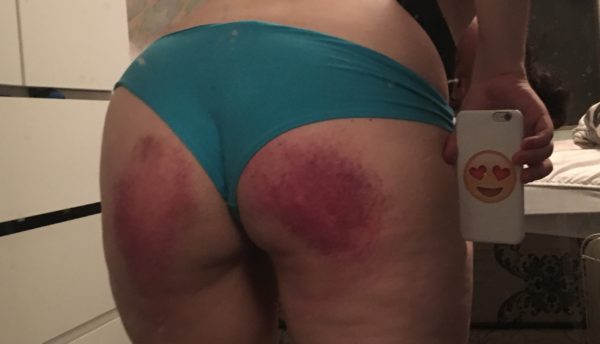
Heads up, babes: this post deals with bruising and other visible signs of (consensual) injury, as well as self-harm. If that’s tough subject matter for you, please feel free to skip this post!
“I’ve never spanked anyone before,” Dane mentions offhandedly as we’re hanging out before our porn shoot.
“Oh,” I say, and my stomach drops. “Um, that’s fine, it’s not too hard to learn. I trust you.” I take my Tantus Pelt paddle out of my bag and show her how it works: the momentum, the swing, the snap. It’s been a few weeks since a partner’s used this mean little thing on me and I’m excited to bend over for my hot new friend in front of a rolling video camera.
What I don’t say, and later wish I had: Start slow, and work your way up. Warm up the area with gentle smacks til it’s red and glowing, before you progress to harder wallops. Spread out the impacts, instead of focusing on one spot. Rhythm and consistency are good, but give me time to breathe. I think these things but don’t communicate them. I said I trust her, and I do.
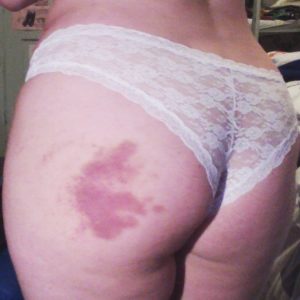 The scene goes better than I ever hoped or expected, given how nervous I was when we began. She teases and spanks and fucks me over a wooden coffee table in the airy afternoon light. But that paddle. Oh, that paddle.
The scene goes better than I ever hoped or expected, given how nervous I was when we began. She teases and spanks and fucks me over a wooden coffee table in the airy afternoon light. But that paddle. Oh, that paddle.
There is a point, somewhere during most spankings, when I cross the threshold between safe, tolerable pain and pain so intense it scares me a little. This threshold is the reason I can’t spank myself effectively: I’ll never leap across that line myself. I need someone to push me.
Dane is bossy and authoritative and mean, and gets me crying within minutes. The silicone paddle rains down relentlessly on my reddening ass. And then she picks a spot on my right cheek and just wails on it. One hit after another, til the pain is a white-hot emergency alert in my brain. I think, I can’t take much more of this. Then I think, No, really, this has to stop. And then a deeper, stronger voice in my head says: No. You can take it. You can take just a little more.
I do. And eventually it ends. I’m left with the best bruise I’ve ever had, a crimson emblem of what I faithfully endured. A blotchy splotch that proudly announces what a very, very good girl I am.
Dane cuddles me on the couch. Caitlin brings me a cupcake. I’m grinning, glowing, good.
Depression comes in waves, arcing over the shoreline of my mind so ominously that I usually see it coming from yards away. I can arrange my schedule so the worst of it will hit when I’m alone, sobbing in bed, shoulders shaking, self-worth crumbling in polite privacy. I mask these desperate spells from my friends whenever I can. But sometimes I can’t.
One night in July, I’m at a party with Bex, Georgia, and a few other friends. But it’s the saddest party I’ve ever been to – even sadder than the surprisingly jovial secular shiva we held when my grandmother died – because I can’t stop crying.
Depression tells you lots of lies, the most pervasive one being that you are unendingly sad, have always been, and will always be. It tells you the tears you cry are justified, because everything is terrible and life is pain. It tells you the glimmers of happiness you once knew have been extinguished and were illusory anyway. It wrings the light from your spirit. It takes everything from you, most crucially, your hope.
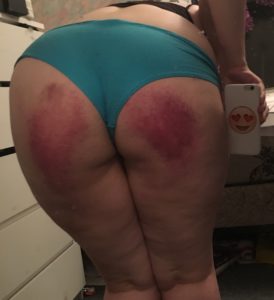 So as I cry in front of my friends and they attempt to comfort me, none of it really works. “We love you,” they say, and my depression-brain says, Yeah, but the people you WISH loved you still don’t love you. “You’re a good person,” they say, and depression whispers, Bullshit, you’re garbage, they’re just humoring you. “You’ll feel better in the morning,” they predict, and depression insists, You will never feel good again.
So as I cry in front of my friends and they attempt to comfort me, none of it really works. “We love you,” they say, and my depression-brain says, Yeah, but the people you WISH loved you still don’t love you. “You’re a good person,” they say, and depression whispers, Bullshit, you’re garbage, they’re just humoring you. “You’ll feel better in the morning,” they predict, and depression insists, You will never feel good again.
What I need, when I’m like this, is to cry very hard for a while and then to be jolted out of my sad, salty rut. I need a distraction, a shake-up, a gear-change. So when Georgia says, “Do you want me to hit you?” some part of me perks up because I know that has worked in the past and it might work again.
I bend over the end of the sofa like a good girl, and Georgia – armed with my KinkMachineWorks Lexan paddle – begins to knock the sadness out of me via my ass.
When I’m sad and I don’t want to be sad anymore, sometimes I think of the saddest thoughts I can possibly imagine, in an effort to push the sadness through my veins faster so I’ll be rid of it sooner. If I’m crying over a boy, for example, I might force myself to think, “He doesn’t love me, he’ll never love me, he doesn’t want me the way I want him and he never will, I’m not good enough for him, I’ll be alone forever, and it’s only going to get worse from here.” Crying harder speeds up the process so I can get on with my life sooner – and spanking can serve a similar function for me. The pain gives me a tangible reason to cry, so I cry harder, feel my feelings deeper, and move through them quicker.
“I love you, babe,” Bex says to me while Georgia spanks me. “You’re being such a good girl,” Georgia says between hits. One friend holds my hand; another strokes my hair. I keep my face planted in the sofa’s upholstery and I cry and cry and cry.
And when it’s all done, I feel a bit better. And I have some epic bruises to remind me that I helped myself by letting my friends help me.
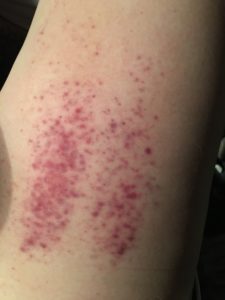 One night by myself in my room, depression sneaks up on me. I didn’t see you come in, I tell it, and it hisses back, That’s because you’re a stupid, silly girl who doesn’t know anything. I can’t argue with that.
One night by myself in my room, depression sneaks up on me. I didn’t see you come in, I tell it, and it hisses back, That’s because you’re a stupid, silly girl who doesn’t know anything. I can’t argue with that.
Sometimes my depression comes alongside a restlessness: I know I need to do something to alleviate the uncomfortable feelings in my body and brain, but it’s not immediately clear what. When I’m coping well, I get out my journal, cry in a hot bath, go see a friend, or curl up with snacks and an episode of Sherlock. When I’m coping less well, I think about hurting myself.
The jury is out – by which I mean, my therapist is unsure – whether my self-spanking counts as self-harm. I don’t really do it to punish myself, to feel more alive, or to enact suicidal ideations, all common reasons people self-harm. I think I do it because it distracts me from the “bad” thoughts and feelings in my head, and because I know spanking has historically alleviated my mental health symptoms. It’s a last-ditch effort to snap myself back to stability.
On this particular night, crying numbly in my desk chair, I just start smacking my thigh with the back of my hand because it feels like the right thing to do. I do it so hard, and for so long, that I worry I might break my hand. I switch hands, and do it some more. I keep going until I’m sufficiently bruised, and the dark whispers in my head have calmed.
The bruise I’m left with is a chaotic mass of speckles, and I instantly hate it. It’s ugly, but I know I wouldn’t think that if a partner had given it to me. Each time I catch sight of it, I’m reminded of how I failed myself, how I let myself down by coping poorly with the feelings that rain down on me. I try to forgive myself, but in the meantime, I wear boxers around the house instead of my usual bikini briefs, so I never have to see the evidence of what depression wrought on my body.
When I was younger, I thought I’d hate one-night stands because sex felt too intimate to share with a near-stranger. As I’ve grown up, I’ve learned so much: sex doesn’t have to be intimate, and there are other valid reasons to hate one-night stands (which I kinda do). But it turns out that for me, kink feels too intimate to share with a near-stranger. It feels like an infringement, a mild violation, an incongruent aberration.
One cold night in December, I go out for drinks with a passably smart-‘n’-sweet Tinder boy. Our hours-long conversation brings out the details of my life that usually emerge on dates like these: I’m a sex writer, I review sex toys, I write about my kinks, and those kinks include spanking.
 When I invite him over to my place after drinks, he makes a logical leap that any reasonable person could make: I like spanking, therefore, I want him to spank me. During our lukewarm hookup, he lands a few hard smacks on my ass, and I make noises of delight – because, physically, this feels like something I’ve enjoyed before. Emotionally, less so. He is nobody to me. I don’t care if he wants to punish me, or thinks I’ve been bad, or wants to make me feel good, or wants to give me what I want. I give zero shits what he thinks of me, and therefore, with him, kink feels irrelevant.
When I invite him over to my place after drinks, he makes a logical leap that any reasonable person could make: I like spanking, therefore, I want him to spank me. During our lukewarm hookup, he lands a few hard smacks on my ass, and I make noises of delight – because, physically, this feels like something I’ve enjoyed before. Emotionally, less so. He is nobody to me. I don’t care if he wants to punish me, or thinks I’ve been bad, or wants to make me feel good, or wants to give me what I want. I give zero shits what he thinks of me, and therefore, with him, kink feels irrelevant.
In the morning, we chat a bit via text, and he asks, “Is your butt even in the least bit sore?” It’s a vanilla-dude question, designed to determine whether his untrained hand even made a dent in my seasoned-kinkster ass. I look in the mirror and there is, faintly, the outline of a handprint. Red finger shapes against my creamy white skin. I text him a picture, though I doubt he even cares.
The bruise is mild, and only lasts a few days. So I spend those days thinking about how gross it feels to be bruised by someone I barely know. One-night stands are okay if I can hop in the shower afterward and wash away their sweat, their spit, their cum. But a bruise stays, and remains both mine and theirs until it fades. I love bruises when they make me feel “owned” by someone I want to own me – but a random-ass stranger from Tinder does not own me and should not bruise me. I glower furiously at the handprint for days, wishing it had come from someone else’s hand.
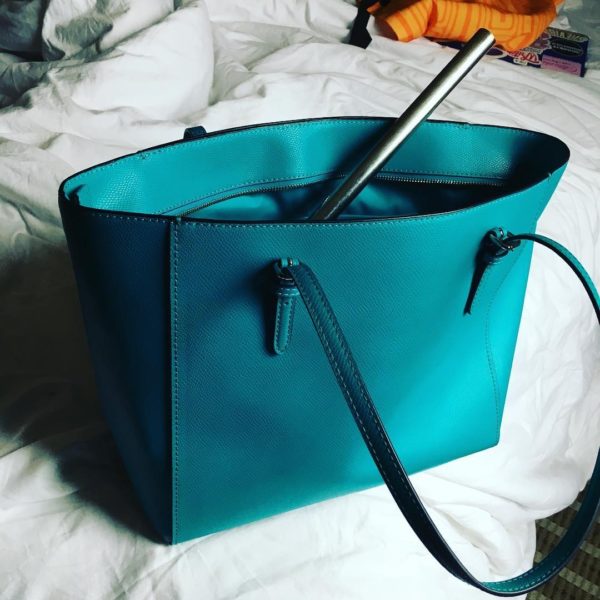
My fave fuckbuddy is extremely vanilla, but he’s also what Dan Savage calls “GGG“: good, giving, and game. He doesn’t “get” the whole spanking thing, but he’ll still do it if I ask – often quite enthusiastically – and I love that about him.
One night in a New York hotel room, we can’t figure out how to open the bottles of apple-ginger cider we brought with us – and we’re high, which makes this quandary even harder. “Let’s go to the front desk and ask if they have a bottle opener,” I suggest, reasonably, to which my FWB replies: “Okay, but you have to do the talking, because I am way too high to talk to a stranger right now.”
We make a giggly pilgrimage to the front desk; the attendant there doesn’t have a bottle opener either. So it’s back to the drawing board (after a meandering journey through the hotel lobby, mezzanine, and basement, laughing maniacally like the stoned delinquents we are). Once we find our hotel room again, we scour it for any and all objects that might function as a bottle opener: a pair of tweezers, the edge of a countertop, a thick bedsheet crumpled in a palm.
Eventually, grasping at straws, my gentleman-friend opens the wardrobe in the corner and pops out the silver metal bar holding up the clothes-hangers. “Oh no, you broke it!” I chirp, my high-brain momentarily unable to process that he did this on purpose. He grins at me in that roguish way he has, and jokes, “Those were load-bearing hangers.” I collapse into ganja giggles on the bed.
The metal bar works. He’s able to push the gaping end of it against the ridged edge of a bottlecap until the cap pops clean off. He hands me the bottle and gets to work on opening one for himself. I sit cheerfully, sipping my cider, one leg dangling off the bed and one draped over his thigh. We clink our drinks together and sip in the comfortable silence of two people who like each other – two people who just simply, uncomplicatedly, happily like each other.
And then I pick up the hanger bar and start whacking myself on the thigh with it, because of course I do.
He laughs darkly in his throat, because he knows me and he knows what’s coming. “Oh, you kinksters and your pervertables,” he says out loud, or maybe just in my memory because that’s the sentiment I sensed from him in my periphery. I take another swig of my cider and put the silver bar in his hand. “You should hit me with this,” I say.
He does. The cool metal lands stripes of pain along my thigh, still hitched over his. His thwacks are more earnest than I’ve ever felt from him; I think he’s finally figured out that when I ask to be hit, I want to be hit. Stoned, tipsy, gettin’ beat, and sitting beside one of my favorite people, I can’t recall many moments as purely, perfectly happy as this one, right here.
 “I want you to give me a bruise,” I tell him, but he’s vanilla and probably needs a little more instruction, so I continue. “Pick a spot. Hit that one spot again and again, starting soft and building up til you’re wailing on it.” I wrap both my arms around the one of his that’s not holding our impromptu impact implement, and press my face into his shoulder. “I might scream, but it’s okay.”
“I want you to give me a bruise,” I tell him, but he’s vanilla and probably needs a little more instruction, so I continue. “Pick a spot. Hit that one spot again and again, starting soft and building up til you’re wailing on it.” I wrap both my arms around the one of his that’s not holding our impromptu impact implement, and press my face into his shoulder. “I might scream, but it’s okay.”
He does exactly what I’ve asked him to do, just like he always does; it’s one of the reasons he’s my favorite FWB I’ve ever had. As the bar slices through the air and onto my thigh again and again, my man-friend mutters in my ear about the way jazz drummers hold their drumsticks. He’s playing me like an instrument. His tone of voice reminds me of a doctor who tells you a cheerful story about elephants or fairies to distract you while he sets your broken bone. I don’t want to be distracted from the pain being rhythmically administered to me, but I like the sound of his voice, the closeness of it, how completely and totally safe I feel with this man who is hurting me at my request.
“There you go,” he says, and stops. “Look at that. Wow!”
I glance down at my thigh and see a thin streak of red, set in beautiful relief against the paleness of my skin. I’ve never seen my thigh look so gorgeous. In the days that follow, I keep hitching up my skirt to take a look, running my hand along the slightly raised mark, pressing the painful spot through my leggings on the subway to remind me that it’s there.
It makes me feel owned, and small, and safe, and happy. It fades, and I want it back. I want it to last forever, like a tattoo. But the nature of bruises is that they don’t last. Like the tumbling petals of a dying flower, they are perfect in their life and in their death. I am always sad to say goodbye to a bruise, and always happy to have had it at all.


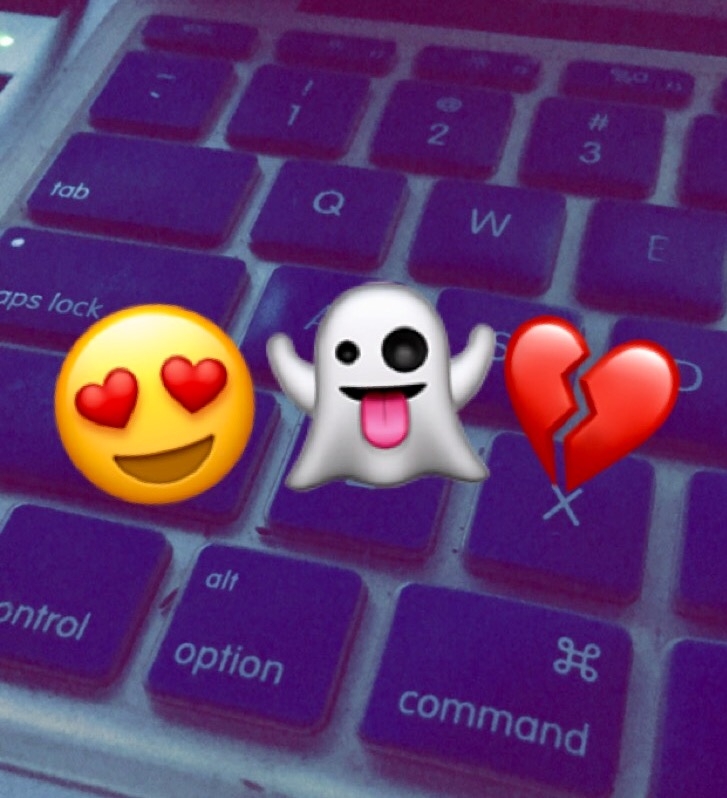
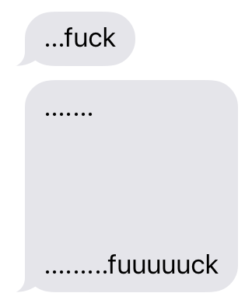 I send him a picture of me. Not a nude – just a cute selfie, where I’m pleased with how I look, and I look like the kind of girl that a man like him might be interested in. “Fuck,” he writes back. “…Fuuuuck. I mean you are just so fucking good-looking.” More cackling at my phone. More blushing, sweating, and covering my eyes. My heart is thudding.
I send him a picture of me. Not a nude – just a cute selfie, where I’m pleased with how I look, and I look like the kind of girl that a man like him might be interested in. “Fuck,” he writes back. “…Fuuuuck. I mean you are just so fucking good-looking.” More cackling at my phone. More blushing, sweating, and covering my eyes. My heart is thudding.
 The
The  So as I cry in front of my friends and they attempt to comfort me, none of it really works. “We love you,” they say, and my depression-brain says, Yeah, but the people you WISH loved you still don’t love you. “You’re a good person,” they say, and depression whispers, Bullshit, you’re garbage, they’re just humoring you. “You’ll feel better in the morning,” they predict, and depression insists, You will never feel good again.
So as I cry in front of my friends and they attempt to comfort me, none of it really works. “We love you,” they say, and my depression-brain says, Yeah, but the people you WISH loved you still don’t love you. “You’re a good person,” they say, and depression whispers, Bullshit, you’re garbage, they’re just humoring you. “You’ll feel better in the morning,” they predict, and depression insists, You will never feel good again. One night by myself in my room, depression sneaks up on me. I didn’t see you come in, I tell it, and it hisses back, That’s because you’re a stupid, silly girl who doesn’t know anything. I can’t argue with that.
One night by myself in my room, depression sneaks up on me. I didn’t see you come in, I tell it, and it hisses back, That’s because you’re a stupid, silly girl who doesn’t know anything. I can’t argue with that. When I invite him over to my place after drinks, he makes a logical leap that any reasonable person could make: I like spanking, therefore, I want him to spank me. During our lukewarm hookup, he lands a few hard smacks on my ass, and I make noises of delight – because, physically, this feels like something I’ve enjoyed before. Emotionally, less so. He is nobody to me. I don’t care if he wants to punish me, or thinks I’ve been bad, or wants to make me feel good, or wants to give me what I want. I give zero shits what he thinks of me, and therefore, with him, kink feels irrelevant.
When I invite him over to my place after drinks, he makes a logical leap that any reasonable person could make: I like spanking, therefore, I want him to spank me. During our lukewarm hookup, he lands a few hard smacks on my ass, and I make noises of delight – because, physically, this feels like something I’ve enjoyed before. Emotionally, less so. He is nobody to me. I don’t care if he wants to punish me, or thinks I’ve been bad, or wants to make me feel good, or wants to give me what I want. I give zero shits what he thinks of me, and therefore, with him, kink feels irrelevant.
 “I want you to give me a bruise,” I tell him, but he’s vanilla and probably needs a little more instruction, so I continue. “Pick a spot. Hit that one spot again and again, starting soft and building up til you’re wailing on it.” I wrap both my arms around the one of his that’s not holding our impromptu impact implement, and press my face into his shoulder. “I might scream, but it’s okay.”
“I want you to give me a bruise,” I tell him, but he’s vanilla and probably needs a little more instruction, so I continue. “Pick a spot. Hit that one spot again and again, starting soft and building up til you’re wailing on it.” I wrap both my arms around the one of his that’s not holding our impromptu impact implement, and press my face into his shoulder. “I might scream, but it’s okay.”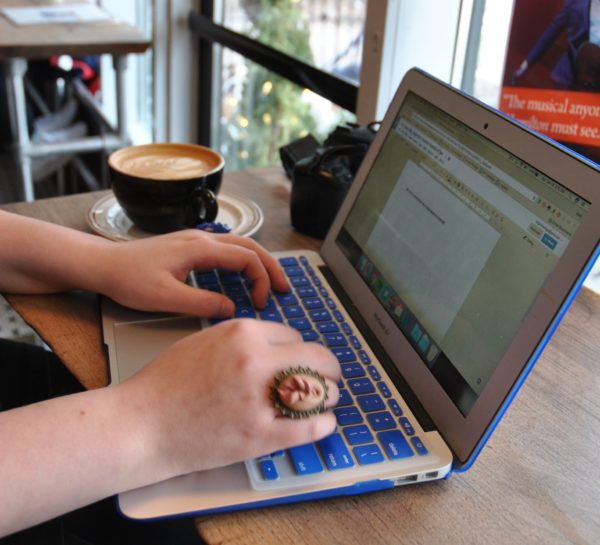
 Batch-process tasks. This is a term and concept I learned from
Batch-process tasks. This is a term and concept I learned from  Know how chemical stimulants affect your body and brain. Sometimes when I’m manic, I’m tempted to drink tons of coffee, because it helps me ride the wave of mania and get even more done than I ordinarily would – or so I think. In reality, the combo of coffee + mania often sends me off the rails into unfocused zippiness that makes it hard to actually get anything done. Similarly, if I drink alcohol while depressed, it usually just depresses me further.
Know how chemical stimulants affect your body and brain. Sometimes when I’m manic, I’m tempted to drink tons of coffee, because it helps me ride the wave of mania and get even more done than I ordinarily would – or so I think. In reality, the combo of coffee + mania often sends me off the rails into unfocused zippiness that makes it hard to actually get anything done. Similarly, if I drink alcohol while depressed, it usually just depresses me further.